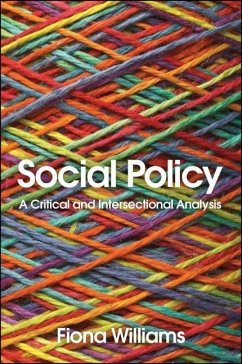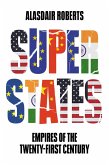Welfare states face profound challenges. Widening economic and social inequalities have been intensified by austerity politics, sharpened by the rise in ethno-nationalism and exposed by the COVID-19 pandemic. At the same time, recent decades have seen a resurgence of social justice activism at both the local and the transnational level. Yet the transformative power of feminist, anti-racist and postcolonial/decolonial thinking has become relatively marginal to core social policy theory, while other critical approaches - around disability, sexuality, migration, age and the environment - have found recognition only selectively.
This book provides a much needed new analysis of this complex landscape, drawing together critical approaches in social policy with intersectionality and political economy. Fiona Williams contextualizes contemporary social policies not only in the global crisis of finance capitalism but also in the interconnected global crises of care, ecology and racialized borders. These shape and are shaped at national scale by the intersecting dynamics of family, nation, work and nature. Through critical assessment of these realities, the book probes the ethical, prefigurative and transformative possibilities for a future welfare commons.
This significant intervention will animate social policy thinking, teaching and research. It will be essential reading for anyone wanting to understand the complexities of social policy for the years ahead.
Hinweis: Dieser Artikel kann nur an eine deutsche Lieferadresse ausgeliefert werden.
This book provides a much needed new analysis of this complex landscape, drawing together critical approaches in social policy with intersectionality and political economy. Fiona Williams contextualizes contemporary social policies not only in the global crisis of finance capitalism but also in the interconnected global crises of care, ecology and racialized borders. These shape and are shaped at national scale by the intersecting dynamics of family, nation, work and nature. Through critical assessment of these realities, the book probes the ethical, prefigurative and transformative possibilities for a future welfare commons.
This significant intervention will animate social policy thinking, teaching and research. It will be essential reading for anyone wanting to understand the complexities of social policy for the years ahead.
Hinweis: Dieser Artikel kann nur an eine deutsche Lieferadresse ausgeliefert werden.
'Fiona Williams has been a vital force in developing critical approaches to social policy. This book brilliantly consolidates and advances our thinking about welfare and welfare states - and does so in a typically subtle and stimulating way. A must-read!'
John Clarke, Emeritus Professor, The Open University
'Breathtaking in its scope, Social Policy sets a challenging analytical and ethical agenda for social policy as a discipline and a praxis. And it contains important messages for all who seek to "build back better" from COVID-19.'
Ruth Lister, Member of the House of Lords and Emeritus Professor of Social Policy, Loughborough University
John Clarke, Emeritus Professor, The Open University
'Breathtaking in its scope, Social Policy sets a challenging analytical and ethical agenda for social policy as a discipline and a praxis. And it contains important messages for all who seek to "build back better" from COVID-19.'
Ruth Lister, Member of the House of Lords and Emeritus Professor of Social Policy, Loughborough University








